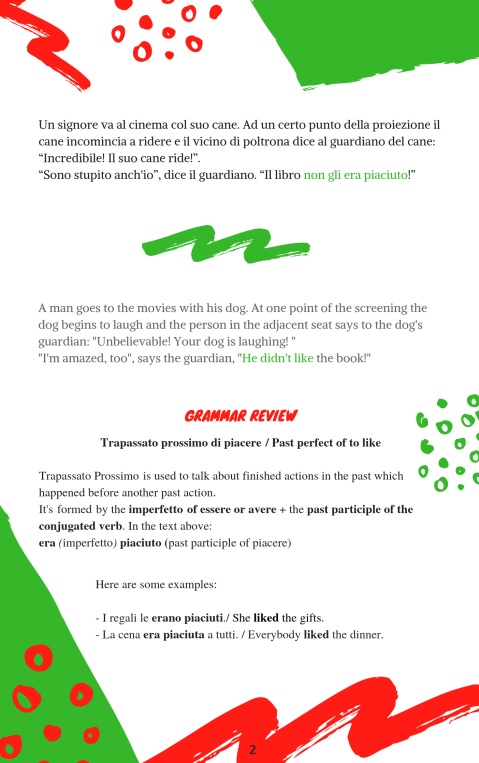
Quasi tutte le persone che raggiungono un livello intermedio d’italiano ad un certo punto del loro percorso d’apprendimento sentono di non riuscire più ad avanzare verso quell’ambita regione della lingua dove i pensieri scorrono facilemente quando si apre bocca. È come se ci fosse un impedimento a raggiunggere una maggiore sicurezza nella lingua parlata evitando i soliti frustranti errori.
Almost all the people who reach an intermediate level of Italian at some point in their learning path feel they can no longer move towards that coveted region of the language where thoughts easily flow when they open their mouth. It’s as if there was an impediment to achieving greater security in the spoken language by avoiding the usual frustrating errors.
Il fatto di non vivere nel paese dove si parla la lingua, in questo caso, la bella Italia, può essere senz’altro un ostacolo, poiché non si è immersi 24 ore al giorno in un ambiente al 100% italiano. Questo non vuol dire che non è possibile comunque continuare ad avanzare, ma ci vuole un piano strategico.
The fact of not living in the country where the language is spoken, in this case, la bella Italia, can certainly be an obstacle, since one is not immersed 24 hours a day in a 100% Italian environment. This does not mean that it’s not possible to continue moving forward, but a strategic plan is needed.
La prima cosa da fare è di porsi alcune domande:
- qual è il mio obiettivo?
- quali sono i rituali che mi aiuteranno ad avanzare?
- quante ore al giorno mi servono di pura immersione nell’italiano?
The first thing to do is to ask yourself some questions:
– what is my goal?
– what are the rituals that will help me move forward?
– how many hours per day do I need of pure immersion in Italian?
Il mio consiglio da procrastinatrice professionale, è d’organizzarti la settimana in modo d’avere un appuntamento fisso e regolare con l’italiano.
Rivediamo insieme in cosa consiste ogni domanda.
My advice as a professional procrastinator is to organize your week so that you have a regular and regular appointment with Italian.
Let’s review together what each question consists of.
Qual è il mio obiettivo? / What is my goal?
Fondamentale! Se non sai dove vuoi andare sarà difficile arrivarci. Il tuo obiettivo potrebbe essere di avere una pronuncia impeccabile oppure posizionare le preposizioni sempre al posto giusto. Basta sapere cosa devi migliorare per raggiungere il tuo obiettivo e sarai sulla strada giusta.
Fundamental! If you don’t know where you want to go it will be difficult to get there. Your goal could be to have an impeccable pronunciation or to place the prepositions always in the right place. Just know what you need to improve to achieve your goal and you will be on the right track.
- Quali sono i rituali che mi aiuteranno ad avanzare? / What are the rituals that will help me advance?
In base al tuo obiettivo ci sono diversi rituali e attività da considerare. Il rituale serve per creare un’abitudine regolare. Per esempio, parlare ogni giorno in italiano per 30-60 minuti, leggere a voce alta per 30 minuti, scrivere un’ora al giorno, etc. Sii creativo/a.
Depending on your goal there are several rituals and activities to consider. The ritual serves to create a regular habit. For example, talk every day in Italian for 30-60 minutes, read out loud for 30 minutes, write an hour a day, etc. Be creative.
- Quante ore al giorno mi servono di pura immersione nell’italiano? / How many hours per day do I need of pure immersion in Italian?
Quanto più vuoi avanzare tante piu’ ore ti serviranno. È logico che per poter padroneggiare l’italiano come un madrelingua ti servirà un’immersione intensa di molte ore al giorno. Almeno 4 ore.
The more you want to advance, the more hours you will need. It is logical that to be able to master Italian as a native speaker you will need an intense immersion of many hours a day. At least 4 hours.
Adesso dopo averci pensato, sai cosa devi fare e dove vuoi arrivare, quindi scrivilo sul tuo quaderno d’italiano. A questo punto gli unici ostacoli sono:
La mancanza di disciplina: bisogna scegliere tra “il dolore del rimpianto o il dolore della disciplina.“
Il perfezionismo: non avere paura delle cose difficili e di fare errori.
Now after thinking about it, you know what you have to do and where you want to go, so write it in your Italian notebook. At this point the only obstacles are:
Lack of discipline: you have to choose between “the pain of regret or the pain of discipline.”
Perfectionism: don’t be afraid of difficult things and of making mistakes!
Per avanzare in italiano ti consiglio di parlare parlare e parlare e divertirti!
Ascolta questa barzelletta e prova a ripeterla molte volte. È un esercizio che fa bene all’italiano e all’umore!
To advance in Italian I suggest you talk and talk and have fun!
Listen to this joke and try to repeat it many times. It is an exercise that is good for Italian and your mood!
Nel mio libro ne trovi altre per fare pratica: In my book you’ll find more to practice:
https://www.parlate.ca/laughingandlearningitalian
Ecco una pagina del libro con la barzelletta, la traduzione in inglese e suggerimento linguistico tratto dalla barzelletta. Inoltre avrai anche l’audio da ascoltare:
Here is a page of the book with the joke, the English translation and a linguistic tip taken from the joke. You will also have the audio to listen to:


